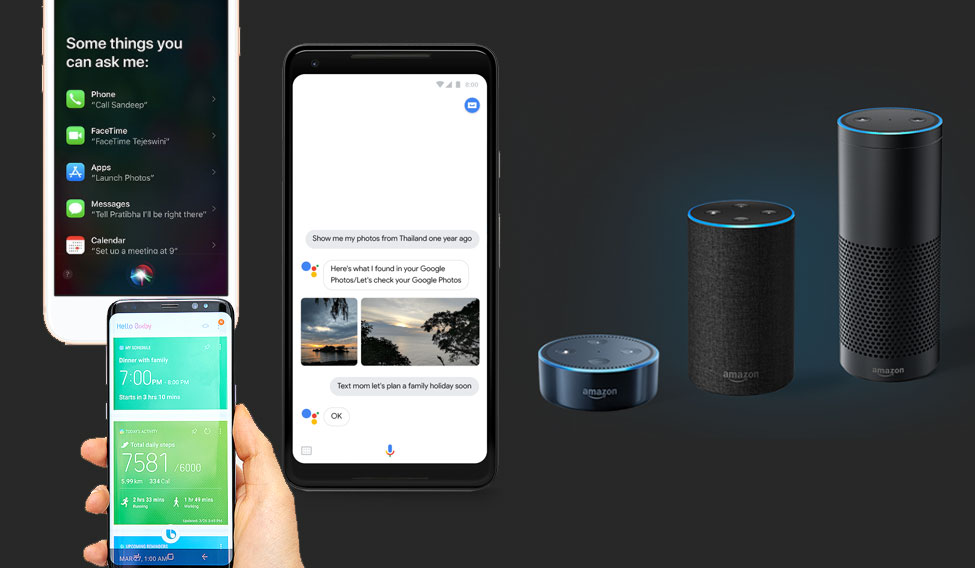October 2017 marked a big step for Amazon. Three years after its global debut, Amazon’s versatile digital assistant—Alexa―finally arrived in India via Echo, the company’s smart speaker. Amazon hasn't rushed with the global roll-out of Alexa, choosing instead to take one stride at a time.
It was Germany last year; India and Japan are part of the Asia game plan for 2017. Alexa hasn't just learned to work with Indian accents but also rounds up a whole bunch of India-specific apps that make it a compelling proposition.
Set up and hardware: The Echo range for India includes three speakers that vary from the diminutive Echo Dot to the taller Echo Plus. We checked out the Echo that sits between these two speakers both in terms of size and price (Rs 6,499) and is likely to be the popular choice. Set up was a breeze via the companion app that hooks up on Wi-Fi; you’re good to go within a couple of minutes. Amazon is mighty proud of its beam-forming technology that combines with seven built-in microphones. They should; Echo heard me from quite a distance despite other external sounds. All you need to do is say ‘Alexa’ and then throw your question or instructions. The other thing that impressed us was the sound quality of the speaker with 360-degree omni-directional sound. Amazon’s tie-up with Saavn allowed Echo to cater to all my requests from Kishore to Imagine Dragons.
Skills: Alexa is clearly more than just a speaker—it’s a digital assistant first and has a host of tricks up its sleeve. First, it's the more random tasks like weather updates and then it’s the trivia where Alexa does a pretty impressive job. There’s a whole ecosystem of apps that sync with Alexa allowing you to do quite a few things with Echo—from ordering a pizza on Zomato to booking your ride on Ola to getting a download on the news headlines through its tie-up with major Indian media houses. There are also some fun apps like Trivia Games, perfect when your friends don't show up on a Pictionary night.
Smart speaker: Alexa will eventually become an integral element in the smart home of the not-so-distant future. From smart lighting—Philips Hue is baked into the Echo—to security to cleaning solutions, smart speakers will play a key role. Google Home has already been unveiled in many markets outside India and Apple’s HomePod will be unveiled in early 2018. These smart speakers will be powered by Google Assistant and Siri, respectively. Then there’s also Bixby, Samsung’s digital assistant that debuted on the Samsung Galaxy S8. Currently, the digital assistant battle is playing out on smartphones with Amazon’s Alexa being the only dedicated smart speaker available for sale in India.
Battle of the assistants
The trigger: Bixby comes with a dedicated hardware key on both the S8 and the Note 8. The on/off key doubles up (with a long press) as a Siri hot key on the iPhone X. The Google Pixel 2 doesn't feature a dedicated hardware key but the home button and just saying ‘Ok Google’ can fire up Google Assistant. As for Alexa, the Echo needs to be plugged in on power standby mode at all times and just needs to hear ‘Alexa’ to swing into action.
Listening skills: Google Assistant and Alexa do pretty well with decoding Indian accents, Bixby is not far behind.
Simple tasks: They are all evenly matched when it comes to doing the simple things whether it’s setting an alarm or clicking a picture. Bixby goes one up on Siri and Google Assistant with some additional skills like posting images on Instagram or Facebook with a voice command.
Intelligence: Google Assistant impressed us with its ability to dig out relevant information, trivia and also stay in a conversation. All assistants were able to name the captain of the Zimbabwe cricket team but only Google Assistant could nail the name of the Afghanistan captain. Each of these assistants were able to cleverly trawl the web for relevant information on questions like ‘Which is the best Japanese restaurant in town’ and share reviews and coordinates.
Language skills: Imagine you’re asking for directions in Moscow or haggling in a street market in Vietnam, Google Assistant is probably your best bet. Siri and Alexa can’t translate while Bixby only shows text results sourced from the web. Google Assistant quickly falls back on Google Translate and generates voice responses that can prove handy when you’re in a remote corner. As for Indian languages, Google Assistant can do this seamlessly only for Hindi at present; when I tried this for Kannada, Bengali or Tamil, I got a text result similar to Bixby.
Special skills: Alexa aggregates multiple apps thereby allowing you to do a lot as long as you’re home. It’s almost like a radio from another era that can talk back, be a companion and do a range of tasks. This will be the template for Google Home and Apple’s HomePod. Bixby can copy text from images and also read wine labels—so that you can appear well heeled while Google Lens on the Pixel 2 cleverly integrates Google search to match the image you scan from your gallery and gives you more background information.
Both Siri and Google Assistant have made rapid strides during the past one year while Bixby has made an impressive debut. Digital Assistants are ready to progress from a ‘good to have’ feature to one that is likely to go mainstream; it might happen as early as 2018.





